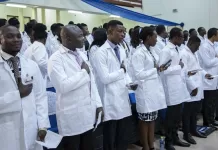The Nigerian health sector is facing challenges associated with outbound medical tourism and deteriorating medical infrastructure.
Also, the sector suffers low government budget allocation, poor compensation and emigration of skilled healthcare workers.

Overhaul Of Health Sector
To revive the sector, the National Economic Council, on Thursday, approved plans to overhaul 17,000 primary healthcare centres nationwide.
Also, it will overhaul 774 secondary healthcare centres to offer Nigerians better healthcare services.
According to the council, the move is in response to identified funding gaps and deteriorating healthcare metrics, as revealed by a presentation by the Coordinating Minister of Health and Social Welfare, Prof. Ali Pate, to the council.
Bauchi State Governor, Bala Mohammed, detailed the government’s strategy to State House Correspondents.
He spoke after the 137th National Economic Council meeting chaired by Vice President Kashim Shettima at the Aso Rock Villa, Abuja.
Conveying the insights from Pate’s presentation, which highlighted the critical condition of the health sector, Governor Mohammed made a statement at the meeting.
“The presentation dissected in terms of very robust sector scan on health, from the tertiary to the primary level, looking at all the gaps, the problems and challenges of funding.”
He lamented the stark statistics showcasing a decline in health indices, including infant mortality rates.
According to him, President Tinubu-led administration aims to establish a synergy among stakeholders for deep, lasting reforms.
People Also Read: Can Nigeria’s Economy Become Prosperous With 7,000mw Electricity?
Also, he announced that the scope of the renewal of the programme intends to “service 17,000 primary health centers to be put on a threshold of viability.
“774 secondary facilities, that is hospitals, in addition to some tertiary institutions.
“This comprehensive plan is designed to make sure medicare is brought close to the majority of Nigerians,” Mohammed added.
Source Of Funding
On the source of funding, Governor Mohammed revealed that “suggestions were made that we could use some taxes from communication.
“Also, from airlines, as well as our taxes from the state government to bridge the financial gaps plaguing the healthcare system.”
Health workers Shortage
Highlighting the critical shortage of healthcare professionals, he also highlighted the “huge problem of human capital and attrition of experts”.
He stressed the necessity of developing strategies to retain local talent.
The Governor said: “Certainly, we have a huge problem of human capital and attrition of experts and the need to develop a strategy to retain our experts to care for our health sector.
“So, the presentation is a robust compact that looked at all the problems and challenges of the health sector.
“From financing, the human capital, from the supervisory point of view, and even on the leadership level, from the presidency to the local governments.
“And there is need for us as governors, local government even media, to put interest in the health sector.”
Mohammed said that while a democratic system like Nigeria’s cannot forcefully stop the outflux of healthcare professionals to other countries in search of greener pastures, plans are underway to manage the brain drain.
However, he urged Nigerian healthcare professionals to be a bit patriotic, citing the health minister who, he said, forewent a more lucrative position at the Global Alliance for Vaccines and Innovation to serve his nation.





